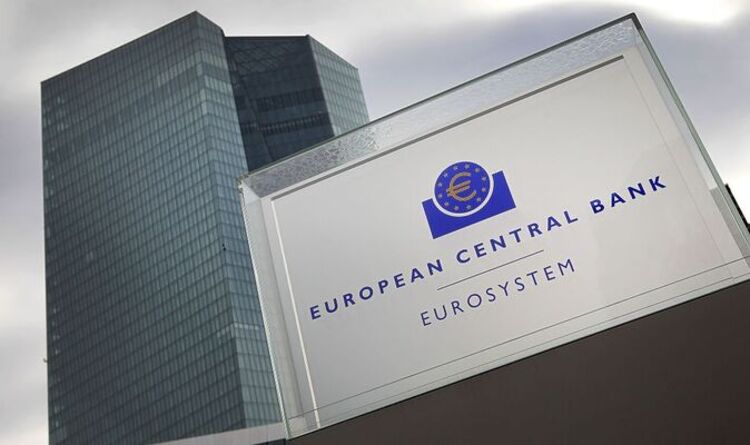Brexit Britain victory as Eurozone inflation expected to ‘double this year’ to 6 percent
The survey has added further pressure on the ECB to increase the interest rates for the first time in a decade. The quarterly survey, conducted by the ECB, suggested a doubling in inflation expectations from an average of 3 percent to 6 percent in 2022, three times the central bank’s target rate.
Christine Lagarde, the ECB president, has warned that the war in Ukraine means inflationary pressures have “intensified” in the short run, but she has failed to commit to a strict end-date for the bank’s mass bond-buying, which she had said previously would halt in the third quarter of this year.
The findings make up part of the ECB’s calculations over whether expectations for future inflation are anchored around its 2 percent target.
Mr Lagarde said after the ECB’s April governing council meeting that a rise in market and survey-based inflation expectations “warranted close monitoring”, as they could help to drive prices higher throughout the economy.
The survey suggested that inflation, which hit 7.5 percent in the eurozone last month, may be showing signs of peaking after record rises in the prices of food, energy and commodities after Russia’s invasion of Ukraine.

We use your sign-up to provide content in ways you’ve consented to and to improve our understanding of you. This may include adverts from us and 3rd parties based on our understanding. You can unsubscribe at any time. More info

The European Union’s economy is heavily exposed to the effects of the war, given the bloc’s reliance on Russian energy imports and the humanitarian costs associated with millions of Ukrainian refugees fleeing west across European borders.
The forecasters’ survey also revised up next year’s projected inflation from 1.8 percent to 2.4 percent and kept 2024’s forecast unchanged at 1.8 percent.
Longer-term inflation expectations rose from 2 percent to 2.1 percent.
The central bank has said that it will first end its mass bond purchases and will begin to raise rates “some time after”.
Market expectations suggest that September and December are the most likely dates.
Mr Lagarde said that the reimposition of lockdowns in some Chinese cities was adding to cost pressures by causing further disruption to global supply chains.
The forecasters’ survey downgraded eurozone economic growth from 4.2 percent to 2.9 percent this year and to 2.3 percent next year.
DON’T MISS:
Russia may be in ‘default’ after paying foreign bonds in roubles
Wayne Sleep discusses his friendship with Princess Diana
Fire crews rush to ‘out-of-control’ caravan set ablaze in large farm
The euro fell to a new 2022 low against the dollar after Lagarde’s remarks.
Source: Read Full Article


